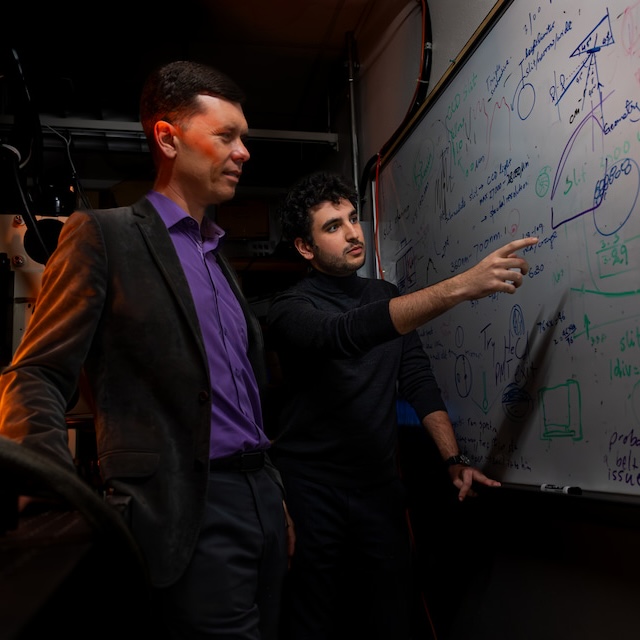Physics
Explore the principles that govern our universe.

Jump into research as an undergraduate by working with faculty and graduate students on topics like optical spectroscopy and imaging, microscopy, nanoscience, biophysics, biomedical diagnosis. You may also learn computer modeling and mathematical analysis of complex processes in the human body or study those on the scale of a single molecule.
Links
Contact
Programs Offered
Sample Courses
- Modern Physics
- Theoretical Methods in Physics
- Thermal Physics
- Electromagnetic Fields
- Mechanics
View Courses & Degree Requirements

Core Curriculum
Your success is at our Core. TCU’s Core Curriculum prepares you to live and work in today’s ever-evolving diverse and global society. It encourages you to be intellectually curious and ask big questions about the world and your place in it.
Special Admission Requirements
There are no special admissions requirements for our undergraduate program. For information on our graduate programs, please review our graduate admission requirements.
Our Faculty
Our faculty conduct research in areas such as astronomy and astrophysics, molecular spectroscopy, biomedical diagnostics and imaging, and experimental and computational biophysics. Our experimental biophysicists lead national and international projects on cancer research, biomedical imaging and nanomedicine involving groups from the United States, Canada, Europe, Japan and South America. Meet our faculty.
What Sets Us Apart
You can join in the battle against cancer, asthma, cystic fibrosis, bacterial infections, cardiovascular and other diseases by conducting biophysics research at TCU and in collaboration with the University of North Texas Health Science Center. An emphasis of physics with a secondary concentration in the biomedical field is available in both the B.S. and B.A. degree programs for students interested in pre-health professions, biotechnology industries or biophysics graduate programs.
Career Prospects
With a degree in physics, you’ll be equipped to pursue graduate study, start career in academia or a national laboratory or work in the leading industries of biotechnology, scientific instrumentation, aerospace and defense.
Related Academic Programs

John V. Roach Honors College
Exceed your own expectations. Incoming and current undergraduate students of every major may apply. Unique classes are offered which connects students with a varied curriculum that is stimulating, supportive and cross-disciplinary.